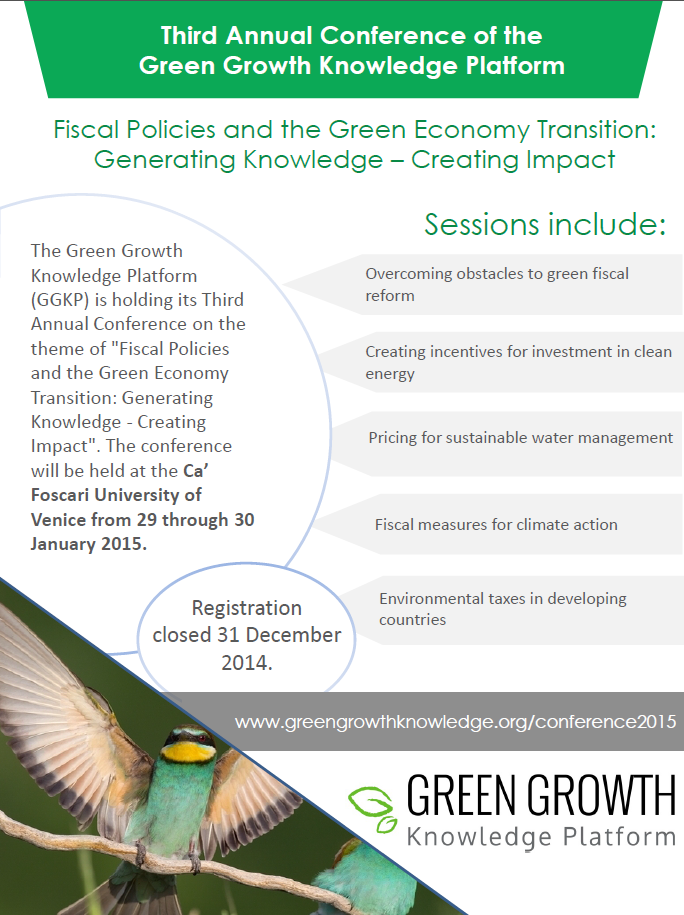
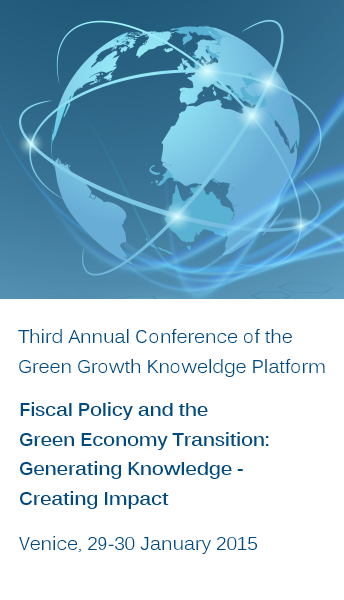 The Green Growth Knowledge Platform (GGKP) held its Third Annual Conference on the theme of "Fiscal Policies and the Green Economy Transition: Generating Knowledge – Creating Impact". The conference, hosted in partnership with the Ca' Foscari University of Venice, The Energy and Resources Institute (TERI) and the United Nations Environment Programme (UNEP), was held at the Ca' Foscari University of Venice from 29-30 January 2015.
The Green Growth Knowledge Platform (GGKP) held its Third Annual Conference on the theme of "Fiscal Policies and the Green Economy Transition: Generating Knowledge – Creating Impact". The conference, hosted in partnership with the Ca' Foscari University of Venice, The Energy and Resources Institute (TERI) and the United Nations Environment Programme (UNEP), was held at the Ca' Foscari University of Venice from 29-30 January 2015.
Download the conference report here.
What role is there for fiscal policy in the transition to a green economy?
Fiscal instruments, such as environmental taxes, pollution charges, subsidies for green technologies, green budgeting, and tax incentives can play a crucial role in promoting a green economy by creating needed fiscal space while limiting environmental externalities. The key to successful implementation and political acceptance of fiscal instruments hinges on effective complementary measures, in particular, addressing distributional impacts.
The Third Annual Conference of the Green Growth Knowledge Platform represents a new kind of conference. A hybrid between a policy and academic conference, it drew together these two communities to jointly discuss and debate the efficacy, geographical applicability and policy implications of various fiscal instruments in the transition to a green economy. The conference aimed to explore cutting-edge research, identify lessons learned, and promote innovative thinking around fiscal policy, as well as to identify knowledge gaps to catalyse further applied research. Over two days, participants engaged in a mix of plenary and parallel sessions, jointly debating the most effective means of introducing and implementing green fiscal measures in various national contexts.
Information on the Conference Review Committee, responsible for the academic content of the conference can be viewed here.
The GGKP Annual Conference took place at San Giobbe, part of the Ca'Foscari University of Venice. San Giobbe is located in Cannaregio, one of the six historic districts of Venice.
- Recommended hotels in Venice
- Access information and transport options to San Giobbe Conference Venue, Venice
- Map of San Giobbe
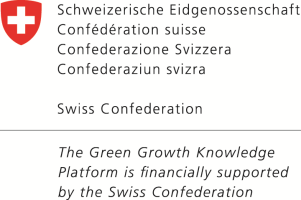
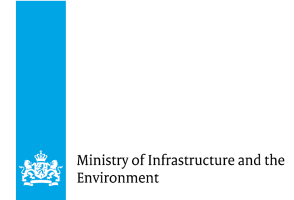
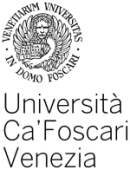
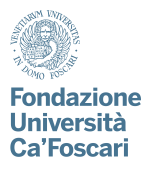
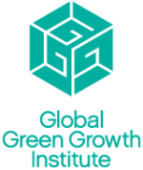
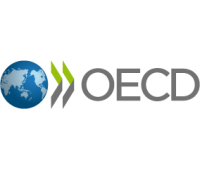
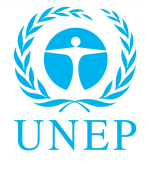
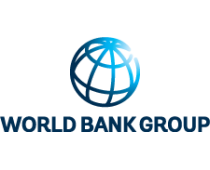
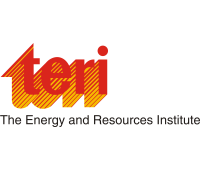
The conference agenda is available here.
Details on the conference poster session are available here.
Download the full list of participants here.
Day 1 Overview - 29 January 2015
8:00-9:00 Registration
9:00-9:30 Welcome address
Chair: Carlo Carraro, Co-Chair, Advisory Committee, Green Growth Knowledge Platform
Speakers:
- Michele Bugliesi, Rector, Ca’ Foscari University of Venice
- Ligia Noronha, Director, Division of Technology, Industry and Economics, United Nations Environment Programme
- Leena Srivastava, Vice Chancellor, TERI University and Executive Director (Honorary), The Energy and Resources Institute
9:30-11:00 High-level panel
Fiscal instruments for green growth – going beyond environmental taxation (Room: Aula Magna)
This high-level panel discussion sets the scene and provides an overall context for the GGKP Annual Conference by triggering debate on some of the unexploited potential of existing tax systems and other structural policies to foster green growth.
Chair: Carlo Carraro, Co-Chair, Advisory Committee, Green Growth Knowledge Platform
Panellists:
- Robert Ford, Deputy Director, Country Studies Branch, Economics Department, Organisation for Economic Co-operation and Development
- Alice Akinyi Kaudia, Environment Secretary, Ministry of Environment and Mineral Resources, Kenya; Co-Chair, Advisry Committee, Green Growth Knowledge Platform
- Francesco La Camera, Director-General for Sustainable Development, Climate and Energy, Ministry of Environment, Land and Sea, Italy
- Edward B. Barbier, John S. Bugas Professor of Economics, University of Wyoming
11:00-11:30 Coffee break
11:30-13:00 Parallel sessions
A1: Designing effective green tax reform (Room: Aula Magna)
This session focuses on how countries can design effective green tax reforms to reduce tax burdens, address social concerns and have a positive environmental impact, with case studies on environmental fiscal reform, carbon taxes and recycling schemes.
Moderator: David O’Connor, Chief, Policy and Analysis Branch, Division of Sustainable Development, United Nations Department of Economic and Social Affairs
Panellists:
- Kai Schlegelmilch (Fiscal considerations in the design of green tax reforms (GGKP commissioned paper)
- Max Franks (Why finance ministers favor carbon taxes, even if they do not take climate change into account)
- Jules Schers (Modeling climate mitigation and economic growth in relation to employment and skills in South Africa)
Discussants:
- Jan Olsson, Environment Ambassador, Ministry of the Environment and Energy, Sweden
- Moustapha Kamal Gueye, Policy Specialist - Green Jobs, International Labour Organization
A2: Creating incentives for investment in clean energy (Room: 9B)
This session highlights opportunities for increasing investment in renewable energy and energy efficiency, including the appropriate choice and design of instruments to address market barriers, strategic subsidies and household behavior.
Moderator: Nikolaus Schultze, Assistant Director-General, Global Green Growth Institute
Panellists:
- Rita Pandey (Role of fiscal instruments in promoting low-carbon technology innovation (GGKP commissioned paper))
- Carolyn Fischer (Strategic subsidies for renewable energy)
- Nadia Ameli (Determinants of households’ investment in energy efficiency and renewables – evidence from the OECD survey on household environmental behaviour and attitudes)
Discussants:
- Alfonso Roggiero, Advisor to the Minister of Environment, Ecuador
- Tilman Altenburg, Head of Department, Sustainable Economic and Social Development, German Development Institute / Deutsches Institut für Entwicklungspolitik (DIE)
A3: Enabling sustainable water management through fiscal measures (Room: 10B)
This session explores how green growth policies in the water sector can address issues of both quantity and quality by encouraging water-related innovation and investment in green infrastructure, with a specific focus on institutional entrepreneurship, water tariffs and environmental surcharges.
Moderator: Steven Stone, Chief, Economics and Trade Branch, United Nations Environment Programme
Panellists:
- Pasquale L. Scandizzo (Rent seeking and institutional entrepreneurship at Colombia's Cauca Valley Corporation)
- Derek Eaton (Paying for clean water and wastewater treatment: an analysis of urban water charging and its contribution to green growth)
- Nabil Haque (Environmental surcharge for heavy polluters in Bangladesh - What are the options for regulated entities under this newly introduced fee?)
Discussants:
- Mauricio Mira Pontón, Head of Office, Green and Sustainable Business Office, Ministry of Environment, Colombia
- Bernard Brès, Technopark Director, International Institute for Water and Environmental Engineering
13:00-14:30 Lunch break
14:30-16:00 Parallel sessions
B1: Overcoming obstacles to green fiscal reform (Room: 9B)
This session examines how to overcome obstacles to green fiscal reform focusing on the use of mitigation measures for vulnerable firms and low-income households, complementary measures for carbon taxes and political implications.
Moderator: Ernst Ulrich von Weizsäcker, Co-President, The Club of Rome (GGKP Advisory Committee Member)
Panellists:
- Sirini Withana (Overcoming obstacles to green fiscal reform (GGKP commissioned paper))
- Miguel Buñuel (Implementing a carbon tax in Spain: how to overcome the fear of inflation?)
- Stefan Speck (Environmental fiscal reform and transition to a green economy - A political economy analysis)
Discussants:
- Malgorzata Kicia, Socio-Economic Analyst, DG Environment, European Commission
- Nils-Axel Braathen, Principal Administrator, Environment Directorate, Organisation for Economic Co-operation and Development
B2: Fiscal policy reform for an inclusive green economy (Room: 10B)
This session shows how effective green policy reform can succeed where other economic models have not and should be considered an integral part of the drive towards eradicating poverty; specific research focuses on carbon pricing, the distributional effects of energy policy and fiscal policy in Indonesia.
Moderator: Joe Grice, Executive Director & Chief Economist, Office for National Statistics, United Kingdom (GGKP Advisory Committee Member)
Panellists:
- David Klenert (The distributional incidence of carbon taxation: The double dividend of redistribution)
- Harry Granqvist (Who should pay for clean energy? Distributive justice perspectives)
Discussants:
- Anthony Dzadzra, Head of Tax Policy, Ministry of Finance, Ghana
- Eshita Gupta, Assistant Professor, Department of Policy Studies, TERI University
B3: Innovating clean technology for green growth (Room: 10C)
This session explores how new technologies and the widespread deployment of existing green technologies can contribute to sustainable development; specific examples focus on optimal energy transition pathways and the impact of uncertainty on innovation.
Moderator: Raouf Dabbas, Senior Advisor, Ministry of Environment, Jordan (GGKP Advisory Committee Member)
Panellists:
- Prudence Dato (Energy transition under irreversibility: a two-sector approach)
- Elena Verdolini (The impact of policy and uncertainty on innovation in the wind industry: evidence from European countries)
Discussants:
- Harald Lossack, Head of Competence Center, Biodiversity, Forests, Natural Resources, Division Environment and Climate Change, Deutsche Gesellschaft für Internationale Zusammenarbeit (GIZ) GmbH
- Joëlle Noailly, Research Associate, Program “Innovation, Sustainable Growth and Technological Change”, Graduate Institute
B4: Promoting green transportation systems (Room: 9C)
This session highlights the potential for fiscal instruments to reduce environmental impacts from the transport sector, including congestion, air pollution and waste; specific examples focus on taxes, feebates and effective car scrapping schemes.
Moderator: Kurt Lonsway, Manager, Environment and Climate Change, African Development Bank
Panellists:
- Gunnar Eskeland (Environmental taxation in the transportation sector (GGKP commissioned paper))
- Theodoros Zachariadis (Feebates as a fiscal measure for green transportation: Insights from Europe and policy implications)
- Giovanni Marin (The role of non-waste 'product innovation' for waste production through reduced lifetime of goods)
Discussants:
- Gallo Sow, Technical Advisor, Ministry of Environment and Sustainable Development, Senegal
- James Seong-Cheol Kang, Principal Transport Specialist, Knowledge Solutions Division, Global Green Growth Institute
16:00-16:30 Coffee break
16:30-18:00 Parallel sessions
C1: Fiscal measures for climate change action (Room: 9B)
This session highlights a range of fiscal measures that can be used to address climate change, with a specific focus on reform of the EU Emissions Trading System, macroeconomic effects, and examples from green fiscal reform in the Netherlands.
Moderator: Ian Parry, Principal Environmental Fiscal Policy Expert, Fiscal Affairs Department, International Monetary Fund
Panellists:
- Edwin Van der Werf (Quantifying the effects of reforming the EU Emissions Trading System. A computable general equilibrium analysis)
- Jan Siegmeier (Climate policy enhances efficiency: A macroeconomic portfolio effect)
- Herman Vollebergh (About dykes and windmills: learning from Dutch green fiscal reform)
Disucssants:
- Malik Amin Aslam Khan, Global Vice President, IUCN; Chair, Green Growth Initiative
- Hilen Meirovich, Climate Change Lead Specialist, Inter-American Development Bank
C2: Water pricing for sustainable water management (Room: 10B)
This session explores the options for water pricing and how they can contribute more substantively to the sustainable financing of water resource management functions; specific examples focus on water pricing and security in urban and rural areas.
Moderator: Rene van Berkel, Chief, Cleaner and Sustainable Production Unit, United Nations Industrial Development Organization
Panellists:
- Mike Young (Fiscal instruments and water security (GGKP commissioned paper))
- Dionisio Pérez-Blanco (Water charging and water saving in agriculture. Insights from a revealed preference model in a Mediterranean basin)
Discussants:
- Hussein Abaza, Senior Advisor to the Minister of Environment, Egypt
- Yimeng Liu, Assistant Professor, Beijing Normal University School of Economics and Resource Management
C3: Effectiveness of fiscal policy in eliciting behavioural change (Room: 10C)
This session illustrates how behavioural, social and technological changes are crucial components of any green growth strategy; specific research focuses on the acceptance of environmental policy and the adoption of technology.
Moderator: Elke Weber, Jerome A. Chazen Professor of International Business, Columbia Business School (GGKP Advisory Committee Member)
Panellists:
- P.K. Viswanathan (Determinants of adopting and accessing benefits of environmentally benign technologies: A study of micro irrigation systems in North Gujarat, Western India)
- Estefania Santacreu Vasut (Beliefs in technology and support for environmental taxes: an empirical investigation)
- Iva Zvěřinová (What makes climate change mitigation policies acceptable by public? A review of influential factors)
Discussants:
- Mark Overman, Senior Policy Officer, Ministry of Infrastructure and Envrionment, Netherlands
- Achim Halpaap, Senior Manager, Environment and Green Development, United Nations Institute for Training and Research
C4: Fiscal measures for biodiversity protection and adaptation (Room: 9C)
This session examines how economic incentives can shift consumption and production patterns regarding biodiversity-based goods and services; specific examples focus on ecological fiscal transfers in Brazil, adaptation expenditures and applications to the Convention on Biological Diversity.
Moderator: Pushpam Kumar, Chief, Ecosystem Services Economics Unit, Division of Environmental Policy Implementation, United Nations Environment Programme
Panellists:
- Nils Droste (Ecological fiscal transfers in Brazil - Incentivizing or refinancing conservation?)
- Elisa Delpiazzo (Fiscal implications of climate change impacts and adaptation policies in EU Mediterranean countries: An application to sea level rise)
- Markus Lehmann (The Convention on Biological Diversity and environmental fiscal measures)
Discussants:
- David Huberman, Policy Advisor, Economics and Environment, Swiss Federal Department of Foreign Affairs
- Martina Bozzola, Environmental Economist, Trade and Environment, International Trade Centre
19:00-20:30 Cocktail reception
Day 2 Overview - 30 January 2015
9:00-10:30 High-level panel
Complementary structural policies for effective fiscal reform (Room: Aula Magna)
This high-level panel explores the broader framework in which green fiscal measures are deployed. More specifically, panellists will discuss the tools and fiscal instruments available to governments to identify, implement and fund efficient and feasible low-carbon trajectories.
Moderator: Cletus Springer, Director, Department of Sustainable Development, Organization of American States
Panellists:
- Simon Upton, Director, Environment Directorate, Organisation for Economic Co-operation and Development
- Marianne Fay, Chief Economist, Climate Change Group, World Bank
Discussants:
- Nick Robins, Co-Director, Inquiry into the Design Options for a Sustainable Financial System, United Nations Environment Programme
- Jan Olsson, Environment Ambassador, Ministry of the Environment and Energy, Sweden
10:30-11:00 Coffee break
11:00-12:30 Parallel sessions
D1: Reforming environmentally harmful subsidies (Room: Magna Aula)
This session focuses on how subsidy reform can be crucial for moving towards a more sustainable development path; specific research focuses on the impact of subsidies on carbon emissions and investment as well as the distributional impact of energy subsidy reform.
Moderator: Karsten Steinfatt, Counsellor, Trade and Environment Division, World Trade Organization
Panellists:
- Debashis Chakraborty (Does fiscal policy influence per capita CO2 emission? A cross-country empirical analysis)
- Shelagh Whitley (At cross purposes: subsidies and climate compatible investment)
- Sebastian Renner (Poverty and distributional impacts of energy subsidy reform in Indonesia)
Discussants:
- Hendra Setiawan, Senior Assistant to the Minister for Economics and Sustainable Development, Ministry of Environment, Indonesia
- Ronald Steenblik, Senior Trade Policy, Organisation for Economic Co-operation and Development
D2: Measuring the effectiveness of fiscal reform (Room: 9B)
This session discusses the strengths and weaknesses of green fiscal reform including a proposed framework for assessing effectiveness, research on the net effect of fuel taxes on global emissions, and fiscal instruments being used in Asia.
Moderator: Ann Harrison, Professor of Multinational Management, The Wharton School, University of Pennsylvania (GGKP Advisory Committee Member)
Panellists:
- Gilbert Metcalf (A Conceptual Framework for measuring the effectiveness of green fiscal reforms (GGKP commissioned paper))
- Hari Bansha Dulal (Delivering green economy in Asia: The role of fiscal instruments)
- Thomas Sterner (The net emissions effects of fuel taxes)
Discussants:
- Aldo Ravazzi Douvan, Senior Adviser for Green Growth, Sustainable Development and Environmental Fiscal Reform, DG Sustainable Development, Climate and Energy, Ministry of Environment, Land and Sea, Italy
- Miguel G. Breceda Lapeyre, Coordinator General for Green Growth, Instituto Nacional de Ecología y Cambio Climático, México
D3: Climate change and fiscal policy (Room: 10B)
This session explores the use of fiscal instruments to mitigate and adapt to climate change; specific examples focus on carbon permit trading between the EU and China, and linkages between climate policy, pensions and public finance.
Moderator: Mohan Munasinghe, Founder Chairman of the Munasinghe Institute of Development
Panellists:
- Claire Gavard (Limited sectoral trading between the EU Emissions Trading Scheme and China)
- Emmanuel Combet (Carbon tax, pensions and deficits: The hidden cost of the compartmentalization of expertise)
- Linus Mattauch (A public finance perspective on climate policy: Six interactions that may enhance welfare)
Discussants:
- Hoseok Kim, Senior Research Fellow, Korea Environment Institute
- Ingrid Jegou, Manager, Global Platform on Climate Change, Trade and Sustainable Energy, International Centre for Trade and Sustainable Development
12:30-13:30 Lunch
13:30-14:15 Poster session
14:15-15:45 Parallel sessions
E1: Addressing the implementation of environmental taxes in developing countries (Room: 9B)
This session explores how environmental taxation can be an efficient and effective way to promote green growth in developing countries, with specific case studies on green tax schemes from South America, Namibia and Vietnam.
Moderator: Gunnar Köhlin, Director, Environment for Development
Panellists:
- Camila Gramkow (Fiscal policy towards green growth in emerging economies: the case of Brazil)
- Carlos Chávez (Using Taxes to Deter Illegal Fishing in ITQ systems)
- Minh Nguyen Anh (Implication of Vietnam's environmental tax law in the green economy transition process)
Discussants:
- Jay Ram Adhikari, Under Secretary (Technical) and Bureau Member, Intergovernmental Platform in Biodiversity and Ecosystem Services, Ministry of Science, Technology and Environment, Nepal
- Zhan Feng Dong, Associate Professor, Chinese Academy for Environmental Planning
E2: Complementary policy for promoting clean technology innovation and adoption (Room: 10B)
This session discusses the need for complementary policy options to drive innovation and investment in clean technology; specific examples focus on renewable energy in OECD countries, wind power in China and the global adoption of fluorescent lamps.
Moderator: Kevin Urama, Managing Director/Head of Research, Quantum Global Research Lab AG (GGKP Advisory Committee Member)
Panellists:
- Francesco Vona (Drivers of investments in cleaner energy)
- Yang Liu (Epidemic, rank, stock and order effects in renewable energy diffusion: a model and empirical evidence from China's wind power sector)
- Suchita Srinivasan (The light at the end of the tunnel: the impact of policy on the global diffusion of fluorescent lamps)
Discussants:
- Giuseppe Nicoletti, Head, Structural Policy Analysis Division, Organisation for Economic Co-operation and Development
- José Palacín, Senior Economic Affairs Officer, United Nations Economic Commission for Europe
E3: Climate change and the green economy transition (Room: 10C)
This session focuses on different ways policymakers can stimulate the transition toward a carbon-neutral economy, with specific cases studies on climate change public expenditure, the Republic of Korea’s Green New Deal and California’s Cap-and-Trade program.
Moderator: Sam Bickersteth, Chief Executive Officer, Climate and Development Knowledge Network
Panellists:
- Erika Jorgensen (Climate change public expenditure and institutional reviews: linking fiscal policies to the green economy transition)
- Jonas Sonnenschein (Fiscal expansion as decarbonization policy. South Korea's Green New Deal 2009-2013)
- Meritt Hughes (Designing for structural change: modification to the California Cap and Trade Program)
Discussants:
- Marcos Eugenio da Silva Sapateiro, National Focal Point for Sustainable Development, Ministry for Coordination of Environmental Affairs, Mozambique
- Massimiliano Riva, Policy Specialist, Innovative Finance, United Nations Development Programme
E4: Effective fiscal policy design for green growth (Room: 9C)
This session examines different instruments that can be used to promote sustainable and more inclusive growth, with specific research that focuses on environmental fiscal reform, trade in green goods and services, and partnerships.
Moderator: Paul Steele, Chief Economist, International Institute for Environment and Development
Panellists:
- Zaid Asi (Environmental Fiscal Reform)
- Jetske Bouma (How do Partnerships in International Cooperation Contribute to Inclusive Green Growth)
- Jaime De Melo (The Critical Mass Approach to Achieve a Deal on Green Goods and Services: What is on the table? How much to expect?)
Discussants:
- Mezgebu Amha Terefe, Director, Macro-economic Management Directorate, Ministry of Finance and Economic Development, Ethiopia
- Kurt van Dender, Head of Unit, Senior Tax Economist at Centre for Tax Policy and Administration, Organisation for Economic Co-operation and Development
15:45-16:45 High-level panel
Catalyzing a global research agenda on fiscal policy (Room Aula Magna)
In this final high-level discussion, panellists will reflect on the key ideas to emerge from the conference, with a focus on how to further a global agenda on fiscal policy in support of a green economy transition. They will also discuss lessons learned, knowledge gaps identified and ways to better promote collaborative and coordinated research.
Moderator: Elliott Harris, Director, United Nations Environment Management Group Secretariat
Panellists:
- Yvo de Boer, Director-General, Global Green Growth Institute
- Ligia Noronha, Director, Division of Technology, Industry and Economics, United Nations Environment Programme
- Thomas Sterner, Professor of Environmental Economics, University of Gothenburg
- Ian Parry, Principle Environmental Fiscal Policy Expert, Fiscal Affairs Department, International Monetary Fund
16:45-17:00 Closing and awards
- Steven Stone, Chief, Economics and Trade Branch, United Nations Environment Programme
- Yvo de Boer, Director-General, Global Green Growth Institute
- Carlo Carraro, Co-Chair, Advisory Committee, Green Growth Knowledge Platform
Coverage of the conference including press, blogs and social media can be found below:
- Insights blog: To what extent the economy should adopt renewable energy and invest in energy saving technologies? by Prudence Dato
- Insights blog: Mainstreaming Green Growth: Venice, the ideal place to wade through the issues by Ryan Parmenter
- Insights blog: Going green unintentionally by Max Franks
- Insights blog: Will fiscal policy help move us towards a green economy? by Carlo Carraro
- Insights blog: Fiscal policies support climate compatible development by Sam Bickersteth and Ari Huhtala
- Insights blog: Up to our knees in it: Venice, GGKP and the century of fiscal policy reform by Steven Stone
- Social media interaction shown through Spotify
- Photo coverage of the GGKP's Third Annual Conference
- News Release - Academics, governments and practitioners jointly call for global green fiscal reform
- Awards at the GGKP's Third Annual Conference
- Special edition of the GGKP "Insights" blog, "Why fiscal policy matters for a green economy transition", by Dr. Carlo Carraro, Dr. Suneel Pandey and Dr. Steven Stone, organizers of the GGKP's Third Annual Conference. The blog presents thResearch highlights from the GGKP’s Third Annual Conference – Q&A with Debashis Chakrabortye case for using fiscal policy to achieve economic, social and environmental goals - highlighting examples in the energy, water and transport sectors and outlining the challenges which exist in practice.
- Water charging and green growth - Mike Young
- Making green fiscal reform happen - Sirini Withana
- Research highlights from the GGKP’s Third Annual Conference – Q&A with Dionisio Pérez-Blanco
- Research highlights from the GGKP’s Third Annual Conference – Q&A with Debashis Chakraborty
- Research highlights from the GGKP’s Third Annual Conference – Q&A with Ambiyah Abdullah
- Research highlights from the GGKP’s Third Annual Conference – Q&A with Nadia Ameli
Follow the GGKP on Twitter for updates and live coverage of the Annual Conference.
Download the conference flyer.
Information on the Conference Review Committee, responsible for the academic content of the conference can be viewed here.
Parallel sessions - A
A1: Designing effective green tax reform
- Fiscal considerations in the design of green tax reforms (GGKP commissioned paper) (presentation) (paper)
Kai Schlegelmilch, Amani Joas - Why finance ministers favor carbon taxes, even if they do not take climate change into account (presentation) (paper)
Max Franks, Ottmar Edenhofer, Kai Lessmann - Modeling climate mitigation and economic growth in relation to employment and skills in South Africa (presentation) (paper)
Jules Schers, Frédéric Ghersi, Franck Lecocq
A2: Creating incentives for investment in clean energy
- Role of fiscal instruments in promoting low-carbon technology innovation (GGKP commissioned paper) (paper)
Rita Pandey, Meeta Keswani Mehra - Strategic subsidies for renewable energy (presentation) (paper)
Carolyn Fischer, Mads Greaker, Knut-Einar Rosendahl - Determinants of households’ investment in energy efficiency and renewables – evidence from the OECD survey on household environmental behaviour and attitudes (presentation) (paper)
Nadia Ameli, Nicola Brandt
A3: Enabling sustainable water management through fiscal measures
- Rent seeking and institutional entrepreneurship at Colombia's Cauca Valley Corporation (presentation) (paper)
Pasquale L. Scandizzo, Ernesto Sanchez Triana - Paying for clean water and wastewater treatment: an analysis of urban water charging and its contribution to green growth (presentation) (paper)
Derek Eaton - Environmental surcharge for heavy polluters in Bangladesh - What are the options for regulated entities under this newly introduced fee? (presentation) (paper)
Nabil Haque, Sungida Rashid
Parallel sessions - B
B1: Overcoming obstacles to green fiscal reform
- Overcoming obstacles to green fiscal reform (GGKP commissioned paper) (presentation) (paper)
Sirini Withana - Implementing a carbon tax in Spain: how to overcome the fear of inflation? (presentation) (paper)
Miguel Buñuel - Environmental fiscal reform and transition to a green economy - A political economy analysis (presentation) (paper)
Stefan Speck
B2: Fiscal policy reform for an inclusive green economy
- The distributional incidence of carbon taxation: The double dividend of redistribution (presentation) (paper)
David Klenert, Gregor Schwerhoff, Ottmar Edenhofer - Who should pay for clean energy? Distributive justice perspectives (presentation) (paper)
Harry Granqvist, David Grover
B3: Innovating clean technology for green growth
- Energy transition under irreversibility: a two-sector approach (presentation) (paper)
Prudence Dato - The impact of policy and uncertainty on innovation in the wind industry: evidence from European countries (presentation) (paper)
Elena Verdolini, Pierre Jockers, Valentina Bosetti
B4: Promoting green transportation system
- Environmental taxation in the transportation sector (GGKP commissioned paper) (presentation) (paper)
Gunnar Eskeland, Haakon Lindstad - Feebates as a fiscal measure for green transportation (presentation) (paper)
Theodoros Zachariadis, Sofronis Clerides - The role of non-waste 'product innovation' for waste production through reduced lifetime of goods (presentation) (paper)
Giovanni Marin, Roberto Zoboli
Parallel sessions - C
C1: Fiscal measures for climate change action
- Quantifying the effects of reforming the EU Emissions Trading System. A computable general equilibrium analysis (presentation) (paper)
Edwin Van der Werf, Corjan Brink, Herman Vollebergh, Martijn Verdonk - Climate policy enhances efficiency: A macroeconomic portfolio effect (presentation) (paper)
Jan Siegmeier, Linus Mattauch, Ottmar Edenhofer - About dykes and windmills: learning from Dutch green fiscal reform (presentation) (paper)
Herman Vollebergh
C2: Water pricing for sustainable water management
- Fiscal instruments and water security (GGKP commissioned paper) (presentation) (paper)
Mike Young - Water charging and water saving in agriculture. Insights from a revealed preference model in a Mediterranean basin
Dionisio Pérez-Blanco
C3: Effectiveness of fiscal policy in eliciting behavioural change
- Determinants of adopting and accessing benefits of environmentally benign technologies: A case study of micro irrigation systems in North Gujarat, Western India (presentation) (paper)
P.K. Viswanathan, Chandra S. Bahinipati - Beliefs in technology and support for environmental taxes: an empirical investigation (presentation) (paper)
Estefania Santacreu Vasut, J. Vives-Rego - What makes climate change mitigation policies acceptable by public? A review of influential factors (presentation) (paper)
Iva Zvěřinová, Milan Ščasný, Eva Kyselá
C4: Fiscal measures for biodiversity protection and adaptation
- Ecological fiscal transfers in Brazil - Incentivizing or refinancing conservation? (presentation) (paper)
Nils Droste, Guilherme Lima, Peter May - Fiscal implications of climate change impacts and adaptation policies in EU Mediterranean countries: An application to sea level rise (presentation) (paper)
Elisa Delpiazzo, Gabriele Standardi, Ramiro Parrado - Convention on Biological Diversity’s decisions on environmental fiscal measures (presentation) (paper)
Markus Lehmann
High-level panel: Complementary structural policies for effective fiscal reform
- Achieving low-carbon growth: planning, incentives and financing (presentation)
Marianne Fay - Financing reform and the green economy: Exploring complementaty structural policies (presentation)
Nick Robins
Parallel sessions - D
D1: Reforming environmentally harmful subsidies
- Does fiscal policy influence per capita CO2 emission? A cross-country empirical analysis (presentation) (paper)
Debashis Chakraborty, Sacchidananda Mukherjee - At cross purposes: subsidies and climate compatible investment (presentation) (paper)
Shelagh Whitley - Poverty and distributional impacts of energy subsidy reform in Indonesia (presentation) (paper)
Sebastian Renner, Jann Lay, Michael Schleicher, Nunung Nuryartono
D2: Measuring the effectiveness of fiscal reform
- A conceptual framework for measuring the effectiveness of green fiscal reforms (GGKP commissioned paper) (presentation) (paper)
Gilbert Metcalf - Delivering green economy in Asia: The role of fiscal instruments (presentation) (paper)
Hari Bansha Dulal, Rajendra Dulal, Pramod Kumar Yadav - The net emissions effects of fuel taxes (presentation) (paper)
Thomas Sterner, Carolyn Fischer, Jared Carbone
D3: Climate change and fiscal policy
- Limited sectoral trading between the EU Emissions Trading Scheme and China (presentation) (paper)
Claire Gavard, Niven Winchester, Sergey Paltsev - Carbon tax, pensions and deficits: The hidden cost of the compartmentalization of expertise (presentation) (paper)
Emmanuel Combet, Jean Charles Hourcade - A public finance perspective on climate policy: Six interactions that may enhance welfare (presentation) (paper)
Linus Mattauch, Jan Siegmeier, Max Franks, David Klenert, Anselm Schultes, Ottmar Edenhofer
Parallel sessions - E
E1: Addressing the implementation of environmental taxes in developing countries
- Fiscal policy towards green growth in emerging economies: the case of Brazil (presentation) (paper)
Camila Gramkow - Using Taxes to Deter Illegal Fishing in ITQ systems (presentation) (paper)
Carlos Chavez, Hugo Salgado - Implication of Vietnam's environmental tax law in the green economy transition process (presentation) (paper)
Minh Nguyen Anh
E2: Complementary policy for promoting clean technology innovation and adoption
- Drivers of investments in cleaner energy (presentation) (paper)
Francesco Vona, Elena Verdolini - Epidemic, rank, stock and order effects in renewable energy diffusion: model and empirical evidence from China's wind power sector (presentation) (paper)
Yang Liu, Taoyuan Wei - The light at the end of the tunnel: the impact of policy on the global diffusion of fluorescent lamps (presentation) (paper)
Suchita Srinivasan
E3: Climate change and the green economy transition
- Climate change public expenditure and institutional reviews: linking fiscal policies to the green economy transition (presentation) (paper)
Erika Jorgensen - Fiscal expansion as decarbonization policy. South Korea's Green New Deal 2009-2013 (presentation) (paper)
Jonas Sonnenschein, Luis Mundaca - Designing for structural change: modification to the California Cap and Trade Program (presentation) (paper)
Merritt Hughes
E4: Effective fiscal policy design for green growth
- Environmental Fiscal Reform (presentation) (paper)
Zaid Asi - How do Partnerships in International Cooperation Contribute to Inclusive Green Growth (presentation) (paper)
Jetske Bouma, Ezra Berkhout - The Critical Mass Approach to Achieve a Deal on Green Goods and Services: What is on the table? How much to expect? (presentation) (paper)
Jaime De Melo, Mariana Vijil

